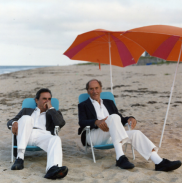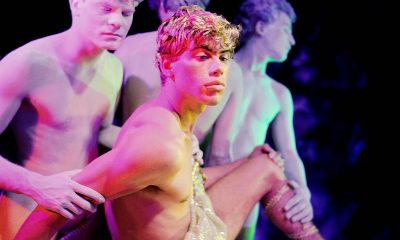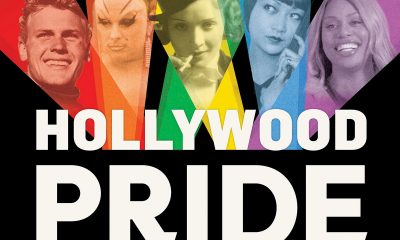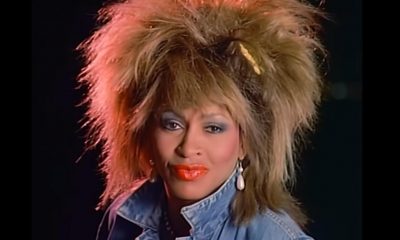Arts & Entertainment
From Broadway to Hollywood
‘Double Life’ memoir recounts 50-year love story of artist and TV mogul
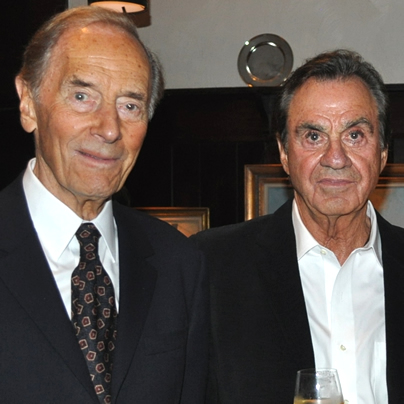
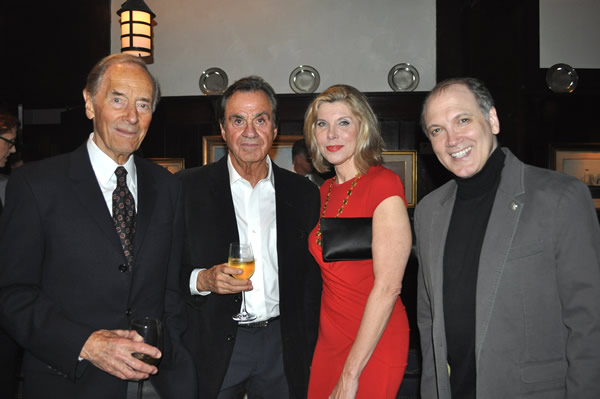
From left, Alan Shayne and Norman Sunshine with Christine Baranski and Charles Busch at a launch party for their book in November. They’ll be in Washington this week for a similar event. (Photo courtesy Scott Manning & Associates)
Careers in the arts are never easy, but for every Sinatra, Hepburn or Garland there are hundreds, perhaps thousands, of actors, singers and behind-the-scenes moguls and designers who manage long, successful careers in New York or Hollywood without becoming household names.
Alan Shayne and Norman Sunshine are two such figures. Shayne is a former actor-turned-casting agent-turned TV mogul who nurtured hit ‘70s shows like “Dukes of Hazzard” and “Alice” to the airwaves during his 10 years as president of Warner Brothers Television. Sunshine, his partner of 50 years, is a painter and sculptor who made ads for Blackglama Minks (“What becomes a legend most?”) and Danskins (“Danskins are not just for dancing”) famous between stints of having his own exhibitions and commercial projects. After decades of navigating the thick jungles and uphill battles of the art world and entertainment industry, one wonders their thoughts on the ways of those worlds: with tenacity, does the cream inevitably rise or have we missed geniuses along the way?
They say it’s gotten tougher to “make it” over time.
“I think the thing I’ve observed in the fine arts is the phenomenon of money coming into play more and more in which careers are measured by the amount of money that can be made off of it,” Sunshine says. “All these art fairs are really about money, the dealers and collectors being able to make money off of it. It’s different. I don’t know how one quite survives that … there’s a horrendous fickleness now on a scale we’ve not seen before.”
Shayne, who gave up acting because casting seemed more stable and practical, agrees.
“It’s a really tough road to hoe,” he says. “In my day, I could go to New York and live and rent a room for $5 a week and make it work. Now you can’t possibly do that. I don’t know how the young actors and young artists do it today. Yes, the Meryl Streeps and the Dustin Hoffmans and the Robert De Niros are going to succeed but I worry about some of the little people who are also very talented.”
In November, the two had their joint autobiography published by Magnus Books — “Double Life: a Love Story from Broadway to Hollywood.” They’ll be in Washington Monday for a private reception for the book.
And even though the book is drawing raves — Joan Rivers called it “beautifully written” and “filled with humor” and legendary critic Rex Reed called it a “riveting” book by “two extraordinary men” — Shayne and Sunshine, who worked on it for about three years, say getting it published was not easy.
“We got the most glowing rejection letters you could imagine from the leading publishing houses,” Shayne says.
He says it was worth the effort to get the book in print to show that long-term gay relationships are possible.
“We’d been terribly disturbed by the suicides,” Shayne says. “Time magazine did a story where they talked to young gays in their 20s who didn’t believe any [gay] relationship could last past 10 years. People have told us we’re a rather inspirational couple so we decided to tell our story.”
“There had always been this thinking that, ‘Oh God, it’s a terrible life,’” Sunshine says. “We wanted to kind of deal with that issue and let people know we’re not always in feathers or this and that. We’re like you. We have the same loves, desires and careers. We felt we had a responsibility to tell that story.”
And it is quite a story. With fun anecdotes of the famous paths with whom they’ve crossed — Lena Horne, Laurence Olivier, Marlon Brando, David Susskind, Helen Hayes, George Cukor, Katharine Hepburn, Norman Lear, Bette Davis, Rock Hudson and more make memorable appearances — the book is delightfully shameless in its name dropping.
Just as vivid, though, are lengthy passages where the two write evocatively of what it was like to be gay in the ‘50s and ‘60s, to what degree they were able to be out (if at all) and how their relationship evolved over the decades. Shorn of any Jackson-Paris-type false idealism — they make it clear it wasn’t always a bed of roses — their experiences come vividly to life.
“We felt we had to be totally honest for the book to work,” Shayne says. “We found out things about each other we didn’t know but we felt if we weren’t totally honest about it, what would be the point? Otherwise it would be so goody-goody you couldn’t stand it. But we got through it and that’s really the story of our relationship. We ended up supporting each other.”
“A lot of people have identified very strongly with the book,” Sunshine says. “It gives them insight into the time period and the history of the gay situation vis-à-vis us.”
During a lengthy phone chat from their home in Palm Beach, Fla., the two — on a joint call — happily elaborate on topics touched on in the book.
Though they still drink, it’s mostly just wine these days —they’ve traded in the Rob Roys they drank copiously for years for California chardonnay.
They attribute their long careers to their mutual abilities to adapt. Some opportunities came out of nowhere — like the Tiffany display that helped launch Sunshine’s impressive art career — while others were built piece by piece through painstaking work like the cards Shayne kept on each actor he saw so he’d have a bounty of suggestions to directors casting various projects.
Their various country houses — in Pennsylvania, Connecticut and more — have helped them grow together, they say.
“In the ‘50s, when you couldn’t really be openly gay, our homes became terribly important to us and we were happiest when we were there by ourselves,” Shayne says.
He also says the popular notion that CBS didn’t care about “Alice” spin-off “Flo,” an eponymous sitcom for Polly Holliday’s sassy character, isn’t true. It was not a victim, he says, of the network carelessly changing the show’s time slot repeatedly in those pre-VCR or TiVo days. Shayne says he worked hard to make “Flo” fly just as he’d done with “Alice” in its rocky first season but ultimately the audience wasn’t buying the character in a world outside Mel’s Diner.
But how did “Alice” succeed another five seasons without its most popular character while “Flo” failed?
“I love Polly and at the time, it seemed like a good idea to bring Diane (Ladd — who’d played Flo in the film) back (to ‘Alice’),” Shayne says. “We really had hoped ‘Flo’ would be a big success and believe me, we did everything. We changed writers, changed producers, nothing seemed to work, but God knows we tried. … the public kind of wanted her there saying, ‘Kiss my grits’ in the diner and she became really a different character when she had her own show. She wanted to be different … CBS was actually very cooperative.”
Ironically perhaps, Shayne and Sunshine say though they socialized several times with Cukor, the legendary “old Hollywood” director who was gay and famous for his parties, they never discussed their relationship or homosexuality with him.
“He knew we were a couple, he would invite us both to dinner, but it was always a mixed group. Sometimes Kate (Hepburn, who lived in Cukor’s guest house when she was on the West Coast) would stop by and say hello, but it was all very proper … I don’t think he ever mentioned the word gay to us,” Shayne says.
As for the changing times, they say it’s only in the last eight or 10 years that they’ve felt comfortable being fully out in all aspects of their lives. They wed in Massachusetts eight years ago initially for practical reasons. They were pleasantly shocked at how welcomed they were by the hotel staff where they stayed.
“AIDS really exploded the conversation on gay issues,” Sunshine says. “It was the instrument by which the whole gay thing came out as a national discussion.”
And what about the irony of Sunshine being the Emmy winner in the family despite Shayne’s long career in television (Sunshine won for titles he designed for a special in the mid-‘70s)?
“Can you hear me gnashing my teeth,” Shayne says.

The fifth annual Fredericksburg Pride march and festival was held on Saturday, June 28. A march through the streets of downtown Fredericksburg, Va. was followed by a festival at Riverfront Park.
(Washington Blade photos by Michael Key)



















India
Anaya Bangar challenges ban on trans women in female cricket teams
Former Indian cricketer Sanjay Bangar’s daughter has received support

Anaya Bangar, the daughter of former Indian cricketer Sanjay Bangar, has partnered with the Manchester Metropolitan University Institute of Sport in the U.K. to assess her physiological profile following her gender-affirming surgery and undergoing hormone replacement therapy.
From January to March 2025, the 23-year-old underwent an eight-week research project that measured her glucose levels, oxygen uptake, muscle mass, strength, and endurance after extensive training.
The results, shared via Instagram, revealed her metrics align with those of cisgender female athletes, positioning her as eligible for women’s cricket under current scientific standards. Bangar’s findings challenge the International Cricket Council’s 2023 ban on transgender athletes in women’s cricket, prompting her to call for a science-based dialogue with the Board of Control for Cricket in India and the ICC to reform policies for transgender inclusion.
“I am talking with scientific evidence in my hand,” Bangar said in an interview posted to her Instagram page. “So, I hope, this makes an impact and I will be hoping to BCCI and ICC talking with me and discussing this further.”
On Nov. 21, 2023, the ICC enacted a controversial policy barring trans women from international women’s cricket. Finalized after a board meeting in Ahmedabad, India, the regulation prohibits any trans player who has experienced male puberty from competing, irrespective of gender-affirming surgery or hormone therapy. Developed through a 9-month consultation led by the ICC’s Medical Advisory Committee, the rule aims to safeguard the “integrity, safety, and fairness” of women’s cricket but has drawn criticism for excluding athletes like Canada’s Danielle McGahey, the first trans woman to play internationally. The policy, which allows domestic boards to set their own rules, is slated for review by November 2025.
Bangar shared a document on social media verifying her participation in a physiological study at the Manchester Metropolitan University Institute of Sport, conducted from Jan. 20 to March 3, 2025, focused on cricket performance. The report confirmed that her vital metrics — including haemoglobin, blood glucose, peak power, and mean power — aligned with those of cisgender female athletes. Initially, her fasting blood glucose measured 6.1 mmol/L, slightly above the typical non-diabetic range of 4.0–5.9 mmol/L, but subsequent tests showed it normalized, reinforcing the study’s findings that her physical profile meets female athletic standards.
“I am submitting this to the BCCI and ICC, with full transparency and hope,” said Bangar. “My only intention is to start a conversation based on facts not fear. To build space, not divide it.”
In a letter to the BCCI and the ICC, Bangar emphasized her test results from the Manchester Metropolitan University study. She explained that the research aimed to assess how hormone therapy had influenced her strength, stamina, haemoglobin, glucose levels, and overall performance, benchmarked directly against cisgender female athletic standards.
Bangar’s letter to the BCCI and the ICC clarified the Manchester study was not intended as a political statement but as a catalyst for a science-driven dialogue on fairness and inclusion in cricket. She emphasized the importance of prioritizing empirical data over assumptions to shape equitable policies for trans athletes in the sport.
Bangar urged the BCCI, the world’s most influential cricket authority, to initiate a formal dialogue on trans women’s inclusion in women’s cricket, rooted in medical science, performance metrics, and ethical fairness. She called for the exploration of eligibility pathways based on sport-specific criteria, such as haemoglobin thresholds, testosterone suppression timelines, and standardized performance testing. Additionally, she advocated for collaboration with experts, athletes, and legal advisors to develop policies that balance inclusivity with competitive integrity.
“I am releasing my report and story publicly not for sympathy, but for truth. Because inclusion does not mean ignoring fairness, it means measuring it, transparently and responsibly,” said Bangar in a letter to the BCCI. “I would deeply appreciate the opportunity to meet with you or a representative of the BCCI or ICC to present my findings, discuss possible policy pathways, and work towards a future where every athlete is evaluated based on real data, not outdated perceptions.”
Before her transition, Bangar competed for Islam Gymkhana in Mumbai and Hinckley Cricket Club in the U.K., showcasing her talent in domestic cricket circuits. Her father, Sanjay Bangar, was a dependable all-rounder for the Indian national cricket team from 2001 to 2004, playing 12 test matches and 15 One Day Internationals. He later served as a batting coach for the Indian team from 2014 to 2019, contributing to its strategic development.
Cricket in India is a cultural phenomenon, commanding a fanbase of more than 1 billion, with more than 80 percent of global cricket viewership originating from the country.
The International Cricket Council, the sport’s governing body, oversees 12 full member nations and more than 90 associate members, with the U.S. recently gaining associate member status in 2019 and co-hosting the 2024 ICC Men’s T20 World Cup. The BCCI generated approximately $2.25 billion in revenue in the 2023–24 financial year, primarily from the Indian Premier League, bilateral series, and ICC revenue sharing. The ICC earns over $3 billion from media rights in India alone for the 2024–27 cycle, contributing nearly 90 percent of its global media rights revenue, with the BCCI receiving 38.5 percent of the ICC’s annual earnings, approximately $231 million per year.
Women’s cricket in India enjoys a growing fanbase, with over 300 million viewers for the Women’s Premier League in 2024, making it a significant driver of the sport’s global popularity. The International Cricket Council oversees women’s cricket in 12 full member nations and over 90 associate members, with the U.S. fielding a women’s team since gaining associate status in 2019 and competing in ICC events like the 2024 Women’s T20 World Cup qualifiers. The BCCI invests heavily in women’s cricket, allocating approximately $60 million annually to the WPL and domestic programs in 2024–25, while contributing to the ICC’s $20 million budget for women’s cricket development globally. India’s media market for women’s cricket, including WPL broadcasting rights, generated $120 million in 2024, accounting for over 50 percent of the ICC’s women’s cricket media revenue.
“As a woman, I feel when someone says that they are women, then they are, be trans or cis. A trans woman is definitely the same as a cis woman emotionally and in vitals, and specially, when someone is on hormone replacement therapy. Stopping Anaya Bangar from playing is discrimination and violation of her rights. It is really sad and painful that every transwoman need to fight and prove their identity everywhere,” said Indrani Chakraborty, an LGBTQ rights activist and a mother of a trans woman. “If ICC and BCCI is stopping her from playing for being transgender, then I will say this to be their lack of awareness and of course the social mindsets which deny acceptance.”
Chakraborty told the Blade that Bangar is an asset, no matter what. She said that the women’s cricket team will only benefit by participation, but the discriminating policies are the hindrance.
“Actually the transgender community face such discrimination in every sphere. In spite of being potent, they face rejection. This is highly inhuman. These attitudes is regressive and will never let to prosper. Are we really in 2025?,” said Chakraborty. “We, our mindset and the society are the issues. We, as a whole, need to get aware and have to come together for getting justice for Anaya. If today, we remain silent, the entire community will be oppressed. Proper knowledge of gender issues need to be understood.”
The BCCI and the International Cricket Council have not responded to the Blade’s repeated requests for comment.
Theater
‘Andy Warhol in Iran’ a charming look at intersection of art, politics
Mosaic production plumbs kidnapping plot of iconic artist for humor

‘Andy Warhol in Iran’
Through July 6
Mosaic Theater Company at Atlas Performing Arts Center
1333 H St., N.E., WDC
$70
Mosaictheater.org
Behind the blasé veneer, Andy Warhol was more curious than people knew. Particularly when it came to money. He kept a close eye on how the ultra-rich lived, what fellow artists were being paid and who was paying them, and, of course, all the new and more saleable ways of making and selling art.
In playwright Brent Askari’s “Andy Warhol in Iran,” now playing at Mosaic Theater Company, Warhol (Alex Mills) is brought outside of his usual area of interest when he lands face to face with a young revolutionary. While Warhol could be artistically revolutionary, he didn’t connect with the idea of forgoing the pursuit of money and fame for the infinitely more difficult task of achieving social justice.
The 90-minute play is not fully factual, but rather inspired by Warhol’s real life 1976 trip to Tehran to make portraits of the royal Pahlavi family in the waning days of their reign, with a focus on Farah Diba, the Shah’s elegant wife and Iran’s last empress.
The action unfolds in a Tehran hotel suite boasting a glorious view of the snowcapped Alborz Mountains not far from Iran’s vibrant and bustling capital. It’s here, disguised as room service, that Farhad (played by Nathan Mohebbi) gains entrance to Warhol’s rooms, seeking to kidnap the pop art star to garner attention for the university students’ movement.
Warhol meets the armed intruder with a sort of wide-eyed wonderment, flummoxed why he has been selected for abduction. Warhol can’t understand why a young man like Farhad wouldn’t prefer to be paid a big ransom on the spot, or be cast as a star in one of the Warhol Factory flicks.
When Farhad replies it’s because Warhol is the most decadent artist in the world, Warhol mistakenly takes it for the ultimate compliment. After all, his biggest successes had been connected to celebrity and consumerism (think Campbell’s Soup Cans. 1962).
For Warhol, decadence is aspirational. He made portraits of financiers, movie stars, and jet setters. In fact, he’d been obsessed with the lives of the rich and famous since he was a small kid in Pittsburgh thumbing through Photoplay Magazine while bed bound with Saint Vitus Dance.
Accompanying Warhol to Tehran (unseen) are his business manager Fred Hughes, and Bob Colacello, editor of Interview magazine. Together, they make a merry trio of gay social climbers. These kinds of trips were a boon to the artist. Not only did they solidify a new strata of high society contacts, but were also superbly lucrative, thickly padding the painter’s pockets.
While in Iran, Warhol wanted only to view Farah’s vast world-class collection of jewels, sample the caviar on tap, and get his Polaroids. Then he’d fly first class back to New York and transfer the images to silk screen and sell the portraits to the Persian royals at a hefty price. He didn’t foresee any obstacles along the way.
Serge Seiden’s direction is spot on. He’s rendered a wonderfully even two-hander with a pair of terrifically cast actors. And Seiden plumbs the piece for humor mostly drawn from the absurdity of the situation without missing any of the serious bits.
As Warhol, out actor Mills is instantly recognizable as the eccentric artist. He’s wearing the button-down shirt, jeans, blazer, glasses, and, of course the famed shock of white hair wig (here a little more Karen than Andy). His portrayal is better than an imitation. He gives a bit of the fey and confused, but has also infuses him with a certain dynamism.
The energy works well with the intensity of Mohebbi’s would-be kidnapper Farhad. And while it isn’t a romance, it’s not impossible to think that Warhol might fall for a handsome male captor.
The connection between art and politics is almost always interesting; and though not a super deep dive into the era or the life of an artist, “Andy Warhol in Iran” is a compelling, charming, and sometimes funny glimpse into that intersection.
-

 U.S. Supreme Court3 days ago
U.S. Supreme Court3 days agoSupreme Court upholds ACA rule that makes PrEP, other preventative care free
-

 U.S. Supreme Court3 days ago
U.S. Supreme Court3 days agoSupreme Court rules parents must have option to opt children out of LGBTQ-specific lessons
-

 India5 days ago
India5 days agoIndian court rules a transgender woman is a woman
-

 National4 days ago
National4 days agoEvan Wolfson on the 10-year legacy of marriage equality


